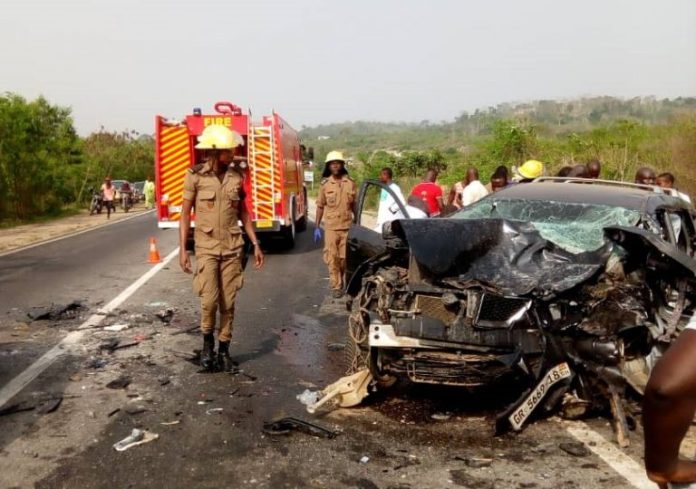Election periods record high number of deaths from road crashes in the country as a result of the disregard for road traffic regulations and other best practices, data from the National Road Safety Authority (NRSA) has indicated.
For instance, in 2016, 44 people died in 100 crashes involving 157 vehicles during the election period in December, representing a 15.6 per cent increase over the same period in 2015. Likewise, in 2020, 44 persons died while 169 sustained injuries in 155 crashes recorded, an increase of 21.9 per cent over the previous year.
The statistics further showed that since 2000, all but one election year recorded higher crashes, injuries and deaths, as compared to previous and ensuing years. In 2004, the deaths increased by 27.4 per cent as compared to 2003; in 2008, it decreased by 5.1 per cent compared to 2007; while in 2012, it increased by 1.9 per cent.
The Director-General of the NRSA, David Osafo Adonteng, who made these revelations was speaking at an election stakeholder meeting organised by the authority in Accra, last week, Thursday. It was attended by political parties, the Electoral Commission (EC), the Motor Traffic and Transport Department (MTTD) and other stakeholders who brainstormed on measures to help curb election-related deaths.
The parties included the New Patriotic Party (NPP), the National Democratic Congress (NDC), the Convention Peoples Party (CPP), the People’s National Convention (PNC) and the Ghana Freedom Party (GFP).
As election fever grips the nation, the spotlight often falls on political rallies and the high-stake drama of electoral contests. Lurking in the shadows of these democratic exercises is a grim and often overlooked reality, the alarming spike in road accidents and fatalities during election years. The statistics as we have just enumerated are sobering.
In their fervent quest to mobilise supporters and win votes, the Political parties often disregard road traffic regulations. Speeding, overloading of vehicles and extended travel hours are common, with little regard for the safety of passengers. This reckless behavior is driven by the pressure to secure votes at any cost, leading to tragic and avoidable loss of lives.
Election-related road crashes are not mere statistics, but represent the loss of human potentials and the grief of families, which goes a long way to affect the chances of the political parties. As Mr. Adonteng poignantly noted, “Winning elections is about numbers and if you lose a life, you will lose a vote and jeopardise your chances of winning the election.”
In response to this crisis, the NRSA has developed a road safety code of practice aimed at curbing election-related road accidents. This code urges political parties to integrate road safety measures into their campaign strategies. Designating individuals knowledgeable in road safety management to coordinate transport arrangements, ensuring vehicles are roadworthy, and employing professionally qualified drivers are critical steps in this regard and The Chronicle strongly buys into this.
However, adopting a code of practice is just the beginning. Political parties must prioritise the lives of their supporters over electoral victory. The culture of impunity and disregard for traffic regulations must be replaced with a commitment to safety and responsibility.
Moreover, the enforcement of this code requires the collective efforts of all stakeholders, including the Electoral Commission (EC), the Motor Traffic and Transport Department (MTTD), and civil society organisations. Rigorous monitoring and stringent penalties for violations must be implemented to ensure compliance.
As we approach another election cycle, let us remember that every life lost on the road is a vote lost and a potential future extinguished. The time to act is now. Political parties, regulators and citizens must work together to ensure that the democratic process does not come at the cost of human lives. The safety of the electorate is paramount and it is high time we treat it as such.








